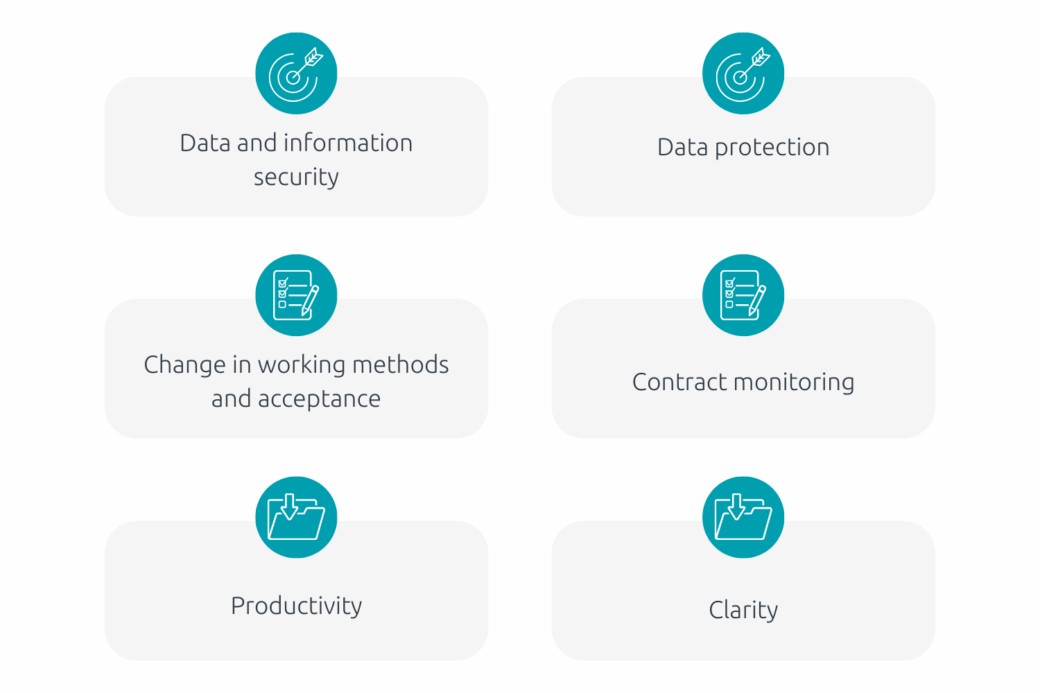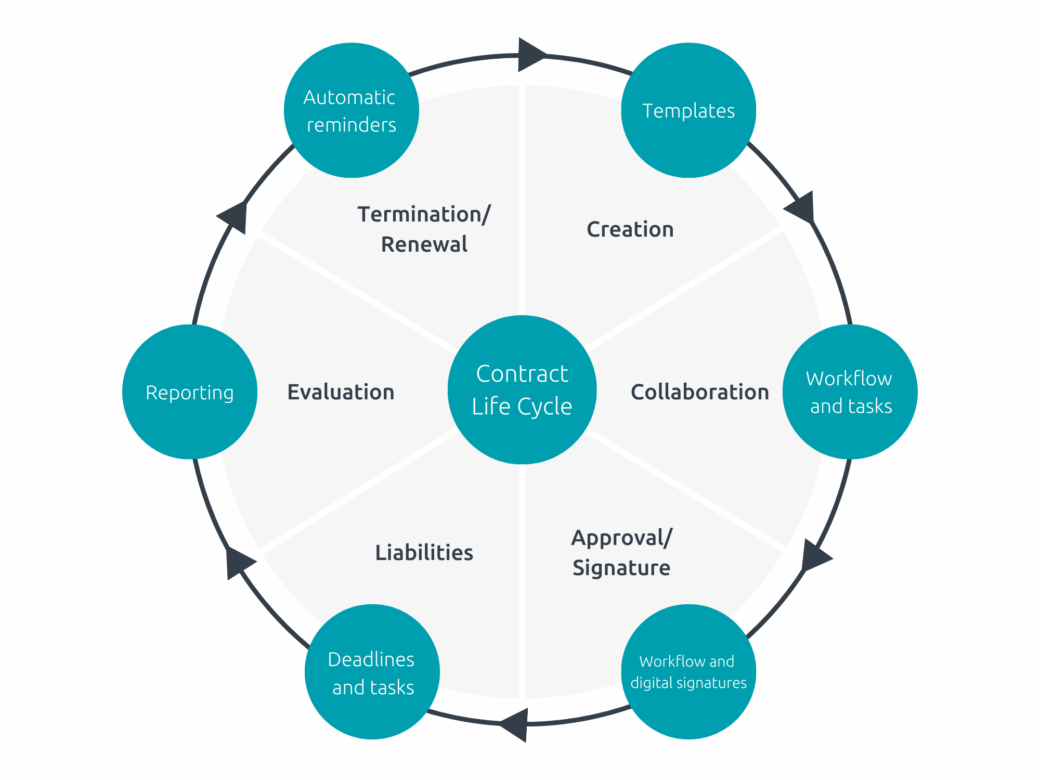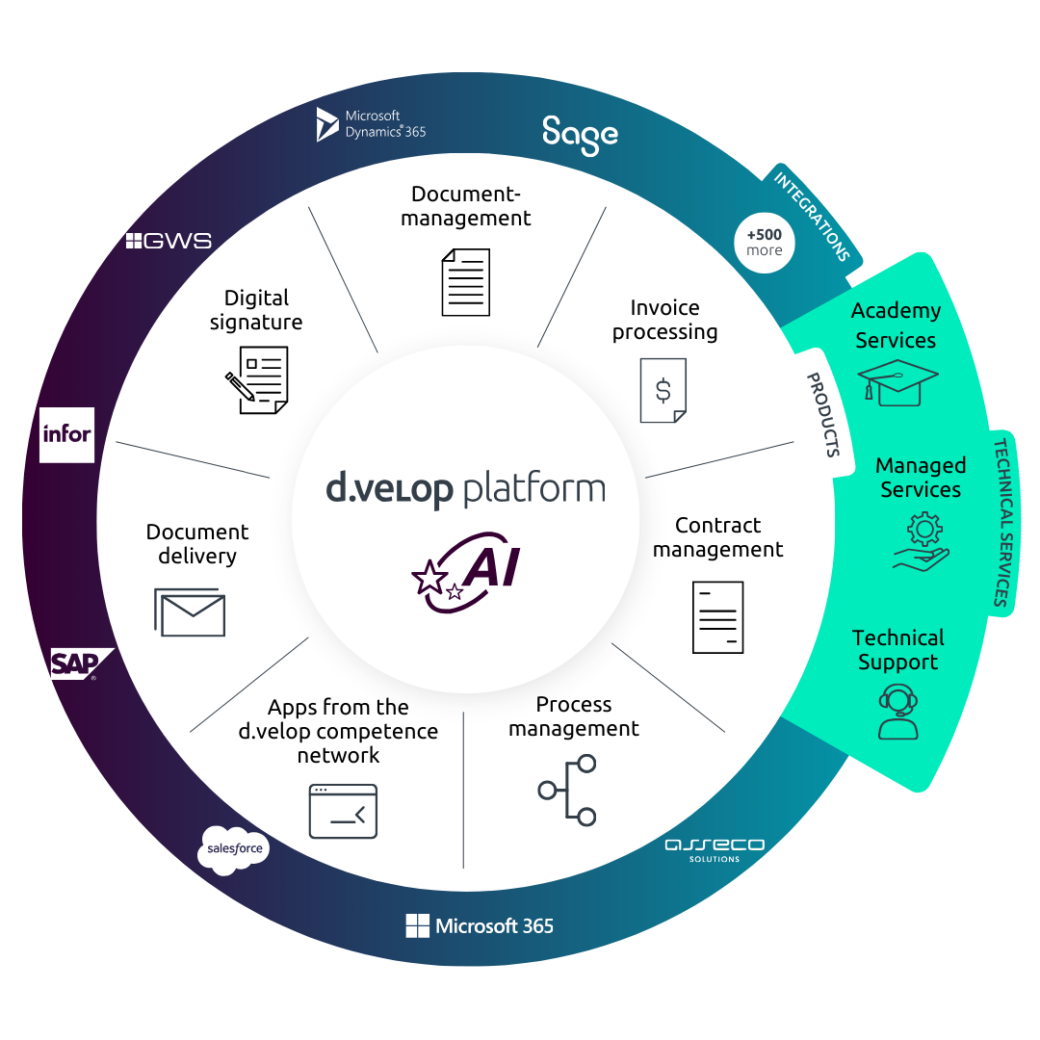What Are the Challenges Faced by Legal Departments?
The digitalisation of legal departments is a task that varies greatly depending on company size, level of digital maturity, and industry. To overcome these challenges, it is essential to develop a tailored digitalisation strategy for each legal team. The following overview highlights common issues that should be considered:
- Data and Information Security: Handling sensitive and confidential information about clients and employees requires legally compliant data security measures.
- Data Protection: Applicable data protection regulations and legal requirements must be observed when using digital tools and cloud services.
- Changing Work Practices and Acceptance: Transitioning to digital workflows requires changes in how people work – and the acceptance of new technologies is key to success.
- Contract Monitoring: Ensuring that contracts are properly adhered to and that potential breaches are identified and addressed early.
- Productivity: Efficient resource management and the ability to handle an ever-increasing workload.
- Clarity: Complex legal information must be made understandable and accessible to support informed decision-making and minimise risk.

Contract Monitoring as a Core Function of the Legal Department
Contracts are an essential foundation for business operations in corporate legal departments. They govern relationships with customers, suppliers, and partners. Effective contract management and monitoring are crucial to minimise legal risks and ensure compliance with agreements.
What Does a Contract Lifecycle Look Like?
From Initiation to Legally Compliant Archiving
Contracts go through a lifecycle that begins with initiation and ends with audit-proof archiving. Key phases include planning, drafting, negotiation, signing, execution, monitoring, and termination. Depending on how digitally advanced a company is and which phases of the lifecycle are already digitalised, different challenges may arise. Below is a typical contract lifecycle as found in many organisations:

- Initiation: In this phase, contract terms and objectives are defined, and initial negotiations with potential contracting parties begin.
- Drafting & Negotiation: The contract is drafted, and the parties negotiate the specific terms to reach an agreement.
- Review & Approval: The contract is reviewed legally and/or internally to ensure compliance with company policies and applicable laws before being approved for signing.
- Signing: The parties formally agree to the contract by signing it.
- Execution: The obligations and activities outlined in the contract are carried out, and the agreed services are delivered.
- Termination & Archiving: The contract is concluded either through fulfilment, termination, or expiration and is archived in accordance with company policies for future reference.
Digital Contract Management in the Legal Department: A Boost to Efficiency!
Modern, software-supported contract management represents a quantum leap in the digitalisation of legal departments. The reasons for adopting digital contract management include:
1. Automated Deadline Compliance
Automated deadline tracking in contract management ensures that no important dates are overlooked or missed. This enhances legal certainty and minimises the risk of contract breaches, saving time and costs associated with legal consequences.
2. Remote Digital Signing
The ability to sign contracts digitally from any location offers flexibility and speeds up the contract process, as signatories do not need to be physically present. This facilitates collaboration, accelerates contract finalisation, and enables efficient handling of business agreements regardless of geographical location.
3. Contract Monitoring and Administration
A structured approach to contract administration enables the legal department to keep track of contract durations, renewals, terminations, and other key deadlines. This simplifies the management and timely updating of contracts.
4. Increased Efficiency
Well-organised contract management streamlines the processes of negotiating, drafting, and managing contracts. It saves time and resources and enables efficient collaboration with other departments and external partners.
5. Transparency
Centralised management of contract data in digital systems provides companies with a clearer overview of all active contracts. This allows for quick access to deadlines, terms, and obligations, facilitating planning and risk assessment.
6. Negotiations and Contract Finalisation
The legal department supports the negotiation, drafting, and creation of contracts using template management. It protects the company’s interests, ensures that contract terms such as durations and notice periods are fair and balanced, and contributes to achieving business objectives.
7. Contract Enforcement
The legal department is responsible for enforcing the company’s contracts. Effective contract management ensures that contractual terms are upheld and that appropriate measures are taken in the event of breaches.
8. Risk Mitigation
Effective contract management helps in-house lawyers identify, assess, and minimise legal risks. By reviewing and negotiating contracts, potential legal pitfalls can be avoided.
9. Legal Compliance
Contracts may include legal requirements, regulations, and industry standards. The legal department ensures that contracts comply with applicable legal frameworks and that the company operates in accordance with the law.
Introducing Digital Contract Management with a Structured Approach
The introduction of digital contract management in a company requires a well-structured approach.
Needs Analysis
The first step involves a thorough analysis of existing contract processes and the specific challenges within this context. From this, clear objectives should be derived.
Implementation Concept
The implementation concept outlines how the objectives will be achieved in practice. Close collaboration between the client and the provider’s project team is essential during this phase.
To ensure successful project execution, it is crucial that all parties communicate as equals and understand both the product’s standard features and any customer-specific adaptations. Early provision of a test or demo environment is extremely valuable for driving implementation efficiently.
Inventory and Assessment
Analysing current contracts and contract structures aims to transfer them meaningfully into a digital system. This includes defining relevant contract information and identifying potential areas for organisational improvement. Key questions to consider:
- What types of contracts exist within your organisation?
- What information should be visible at a glance?
- Are there specific requirements that need to be considered?
- Where is there room for optimisation?
Contract Administration
With a standard installation, contracts can be recorded based on predefined attributes. During the rollout phase, configurations such as contract types and statuses are defined. This enables quick access to use cases like contract administration and search for all employees, with individual access rights implemented as needed during the project.
Deadline Management
Effective contract management includes maintaining and monitoring contract durations and deadlines, such as notice periods, renewal options, and other tasks. This allows for early reminders, optional escalation notifications, and automatic recalculations of deadlines if necessary, ensuring timely termination or renewal.
Change Management and Staff Training
Equally important for a smooth transition is successful change management, including comprehensive training for employees. Our white paper “Project Guide to Contract Management: Analysis, Implementation and Establishment – Achieving Your Goal in 3 Stages” offers detailed insights into the successful introduction of digital contract management in companies.

Wit papier
Contractbeheer op zijn best
In this white paper, we take a closer look at 7 facts about contract management with Microsoft 365. Get the facts you need to put order and transparency back your contract management game.
Table of contents (excerpt)
- Fact 1: With M365, you already have the basic building blocks in your hands
- Fact 2: You will never lose a contract again
- Fact 3: Digital is more efficient
- Fact 4: There are no missed deadlines
- Fact 5: You make the right decisions
- Fact 6: Hand in hand — all departments work together
- Fact 7: Complex is not complicated — your employees will love it
Additional Efficiency Boosters for Your Legal Department
You are already familiar with the software solution d.velop contracts, the digital contract management system. However, there are other software tools that can also provide a significant efficiency boost to your legal department.
Digitalisation with the d.velop platform
With the products of the d.velop platform, we support the digitalisation of your legal department to optimise document-based business processes. The d.velop platform already helps over 3 million people worldwide to manage their documents intelligently and to digitalise business processes with just a click. Manual processes that cost employees valuable time are thus a thing of the past.
d.velop has been investing in the expansion of its platform for years, with a strong focus on SaaS architecture. The d.velop platform has been recognised by Gartner as a “Visionary” in the Magic Quadrant for Content Services Platforms.
- Comprehensive Product Portfolio
- Seamless Integration into Existing Systems
- Industry-Specific Solutions
- Continuous Development
Electronic Signature with d.velop sign
With the electronic signature software d.velop sign, companies can effortlessly, securely, and remotely integrate digital signatures into their workflows and manage them efficiently. The key benefits at a glance:
- Faster contract completion
- Reduced costs (paper, postage, storage) and improved environmental sustainability
- Digital signatures ensure legal validity and security
- Improved traceability and transparency
Simple Process Automation with d.velop process studio
The d.velop process studio enables your legal department to model and automate its own workflows. The department designs the process and specifies within the studio which information is required at which stage. The IT administrator then ensures that the necessary data from third-party systems is inserted at the appropriate points.
Digital Contract Management Increases Competitiveness
Digital contract management addresses a wide range of challenges commonly faced by legal departments in companies. Automating the entire contract lifecycle, reducing manual tasks, improving transparency, and ensuring compliance are key factors that positively impact a company’s competitiveness.
Faster Negotiations, Fewer Risks and Lower Costs
In addition, digital contract management helps accelerate negotiation processes, optimise contract enforcement, minimise legal risks, and reduce costs. These aspects give companies a competitive edge that can ultimately make a real economic difference.
Frequently Asked Questions About the Digital Legal Department
A digital legal department is a legal team that uses modern technologies and digital tools to optimise its processes and work more efficiently.
It is important because it increases efficiency, transparency, and security in legal processes, saves time and resources, improves collaboration, and ensures legal compliance.
Its responsibilities include handling legal matters, managing contracts, minimising legal risks, and ensuring compliance with legal regulations through the use of modern technologies.
The right software improves efficiency, optimises contract management, enhances data security, and supports better collaboration.
Not every company has a digital legal department yet. However, many have already adopted digital tools and technologies to optimise their legal processes. In the future, more and more companies will rely on digital solutions in their legal departments.
A digital legal department is staffed by lawyers, legal advisors, legal assistants, and other professionals who use modern technologies to optimise legal processes and work more efficiently.
Contact & Consultation
We Connect Data and People – And Look Forward to Hearing from You.
Curious? We’d be happy to show you our software.
Simply request a live demo.

